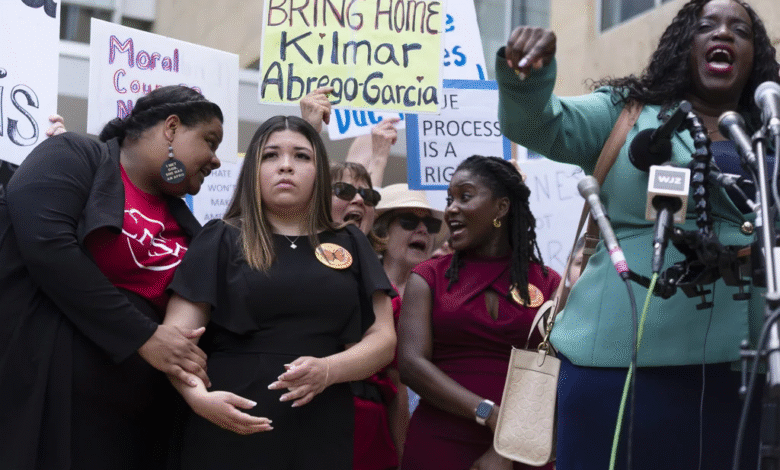Abrego Garcia Case: Trump’s Comments on Immigration Handling

The Abrego Garcia case has emerged as a focal point in discussions about immigration enforcement and due process rights in the United States. Kilmar Abrego Garcia, a Maryland resident, found himself at the center of controversy after being mistakenly deported to El Salvador, igniting a debate around the Trump immigration policies and their impact on undocumented individuals. President Trump asserted that the government has a “very easy case” against Garcia, linking him to the notorious MS-13 gang and charges of transporting undocumented individuals. As the legal proceedings unfold, the case underscores the complexities surrounding the enforcement of immigration laws and the alleged violations of individuals’ rights during an administration noted for its aggressive stance on immigration. With advocates calling for due process, the Abrego Garcia case becomes not only a legal battle but also a symbol of the broader struggles for justice faced by many in the immigration system.
The ongoing legal challenges in the case of Kilmar Abrego Garcia highlight the significant issues related to the enforcement of immigration regulations and the protection of individual rights. This case has brought to light the difficulties faced by individuals caught in the crosshairs of the immigration system, particularly regarding their due process rights and the accusations they face. With a backdrop of intense scrutiny over Trump-era immigration policies, the uproar regarding undocumented individuals and their treatment raises critical questions about fairness and justice. Furthermore, Garcia’s alleged connections to illicit activities and gang affiliations, such as those associated with MS-13, complicate the narrative and provoke discussions about the intersection of crime and immigration law. As advocates and lawmakers confront the implications of this case, it continues to symbolize the broader national discourse on immigration and legal accountability.
The Kilmar Abrego Garcia Case: A Controversial Deportation
The case of Kilmar Abrego Garcia has sparked significant debate within the realm of immigration enforcement, especially given the circumstances surrounding his deportation to El Salvador. President Donald Trump’s remark that the government has a ‘very easy case’ against him reflects a larger narrative that intertwines immigration policies with law enforcement strategies. This case is emblematic of the challenges faced by undocumented individuals who, like Garcia, fall victim to complex immigration laws and processes. The fact that Garcia was mistakenly deported highlights serious concerns within the U.S. immigration system where administrative errors can lead to severe consequences for individuals who have legal standings.
Moreover, the implications of such a case extend beyond just Garcia himself; it sheds light on issues of due process rights as they pertain to undocumented individuals. Critics of the previous administration argue that these rights were systematically undermined, leading to unjust outcomes. With Garcia’s return to the U.S. and the subsequent federal charges linked to allegations of smuggling, the spotlight continues to shine on the intersection of mass deportation strategies and the protections afforded to individuals under the law.
Trump Immigration Policies and Their Impact on Due Process Rights
Under the Trump administration, immigration policies underwent dramatic changes, often prioritizing enforcement over due process. This shift resulted in increased scrutiny and harsher penalties for undocumented individuals, as seen in the case of Kilmar Abrego Garcia. The aggressive stance taken by the administration aimed to deter illegal immigration but often overlooked the fundamental rights of those caught in the system. Advocates argue that such policies undermine the civil liberties that should be afforded to all individuals, regardless of their immigration status.
Critics have raised concerns that the implementation of these policies created environments where due process was not upheld. Cases like that of Abrego Garcia reveal why immigration advocates argue for reforms that ensure protections against wrongful deportations and safeguard individuals’ rights throughout legal proceedings. Ensuring that due process rights are respected is vital in any immigration debate, particularly in light of alarming reports of administrative errors leading to severe repercussions for undocumented individuals.
MS-13 Gang Allegations and Their Role in Immigration Enforcement
The allegations connecting Kilmar Abrego Garcia to the MS-13 gang have added another layer of complexity to his case. This notorious gang has been a focal point of immigration enforcement discussions, particularly within the context of Trump’s policies that aimed to address violence and crime associated with gang activity. By linking Abrego Garcia to MS-13, the narrative serves to demonize not only him but also others who may be embroiled in similar circumstances, thus raising the stakes for undocumented individuals.
These gang-related allegations contribute to the broader strategy of justifying stringent immigration policies. However, as seen in Garcia’s case, such claims also risk perpetuating stereotypes and ignoring the broader socio-political factors that contribute to gang involvement. Furthermore, the linking of undocumented individuals to gangs often encounters pushback from advocacy groups focusing on the need for comprehensive analysis rather than knee-jerk associations that can harm innocent individuals.
Administrative Errors and Their Consequences for Undocumented Individuals
The case of Kilmar Abrego Garcia reveals the significant ramifications of administrative errors within the immigration system. Such mistakes not only disrupt the lives of deported individuals but also raise critical questions about the processes that govern deportation and legal rights. Garcia’s case exemplifies how an error can lead to a prolonged exile, affecting not only his legal status but also his safety and wellbeing, given the dangers present in countries like El Salvador.
This situation calls for reforms that enhance accountability and efficiency within immigration enforcement processes. Advocates argue for thorough investigations before deportations are carried out to prevent wrongful expulsions of individuals who may have legitimate claims for remaining in the U.S. Ensuring that the authorities have accurate information is essential in maintaining justice and protecting the rights of those navigating the often fragmented immigration landscape.
The Legal Battle Post-Deportation: Navigating Rights and Regulations
Following his deportation, Kilmar Abrego Garcia’s legal battle became a focal point for discussions on the rights of undocumented individuals. Garcia’s case highlights the necessity of maintaining robust legal representation and challenging any wrongful accusations, especially in situations where a person’s immigration status is called into question. The charges against him illustrate how quickly an individual’s life can spiral due to allegations that may not reflect their reality.
In this context, legal representation is crucial in advocating for due process rights and ensuring that individuals like Garcia are not left to navigate complex regulations alone. The outcome of these legal battles not only affects the individual but also resonates throughout the community, impacting perceptions of justice within the immigration system.
Abrego Garcia’s Indictment: A View into Abuse of Power Claims
The indictment of Kilmar Abrego Garcia, characterized as an act of smuggling and transporting undocumented individuals, has raised significant concerns regarding the motivations behind such allegations. Garcia’s legal team argues that the charges stem from an abuse of power rather than an earnest pursuit of justice, a narrative that resonates with many in the broader context of Trump’s inflammatory rhetoric surrounding immigration enforcement.
These claims of power abuse bring to light the urgent need for oversight and accountability within immigration enforcement actions. Discussing Garcia’s situation can serve as an impetus for advocacy concerning the rights of individuals caught in similar legal predicaments, ensuring they receive fair treatment while going through the judicial process.
Trump’s Political Narrative: Immigration, Safety, and Enforcement
President Trump’s comments regarding Kilmar Abrego Garcia and the ease with which he believes the case can be prosecuted highlight a political narrative focused on immigration as a matter of safety. This framing has significant implications, as it ties the administration’s immigration policies to broader themes of crime and public security. Trump’s assertions uphold the idea that undocumented individuals are inherently linked to criminal activity, a stereotype that many critics argue is both unfounded and damaging.
This narrative plays a pivotal role in shaping public perception and justifying harsh immigration policies. By emphasizing public safety concerns, the administration sought to garner support for measures that many argue violate the rights of individuals, particularly undocumented individuals who may not be guilty of wrongdoing.
The Role of Advocacy Groups in Garcia’s Case
In response to the case of Kilmar Abrego Garcia, many advocacy groups have stepped forward to highlight the broader implications of his situation. These organizations work to ensure that the voices of undocumented individuals are heard and that their rights are protected amidst a landscape often dominated by legal and political battles. Advocacy groups play a critical role in challenging unjust policies and providing support for individuals facing deportation, ensuring that cases like Garcia’s do not go unnoticed or unchallenged.
These groups also emphasize the importance of due process and strive to promote reforms that would safeguard the rights of all individuals, regardless of their immigration status. In the context of Garcia’s story, such advocacy becomes essential in fostering awareness and support for systemic changes needed within the immigration system to prevent the suffering of unjustly affected individuals.
Political Reactions: Perspectives from Lawmakers on Immigration Enforcement
Political reactions to the Kilmar Abrego Garcia case have varied widely, revealing the deep divisions within lawmakers regarding immigration enforcement strategies. Senators like Chris Van Hollen have spoken out against the perceived injustices faced by individuals like Garcia, advocating for the protection of due process rights. Their stances serve to highlight the human aspect of immigration law, emphasizing that behind every case lies a person with a story deserving of consideration.
On the other hand, remarks from figures within the Trump administration often defend the current strategies as necessary for ensuring public safety and deterring illegal immigration. This divergence reflects broader national dialogues surrounding immigration policies and the balance between enforcement and compassion, calling for a reevaluation of priorities that respects the dignity of all individuals affected.
Frequently Asked Questions
What is the significance of the Kilmar Abrego Garcia case in relation to Trump immigration policies?
The Kilmar Abrego Garcia case highlights critical issues within Trump immigration policies, particularly regarding due process rights for undocumented individuals. After Abrego Garcia was mistakenly deported to El Salvador, his subsequent return to the U.S. and the federal charges against him underscore the complexities and controversies surrounding immigration enforcement under the Trump administration.
How did President Trump respond to the Kilmar Abrego Garcia case during his interview?
During a phone interview with NBC News, President Trump stated that he believes the government has a ‘very easy case’ against Kilmar Abrego Garcia, indicating that the responsibility for his return rested with the Department of Justice, not himself. This response illustrates the administration’s stance on immigration enforcement and legal accountability.
What allegations have been made against Kilmar Abrego Garcia regarding undocumented individuals?
Kilmar Abrego Garcia faces allegations that he was involved in transporting undocumented individuals, with claims suggesting he conducted over 100 illegal trips. These accusations have fueled discussions about immigration and enforcement actions taken during the Trump administration.
What role did due process rights play in the Kilmar Abrego Garcia situation?
Due process rights are at the center of the Kilmar Abrego Garcia situation, as his deportation was based on an administrative error, raising concerns about legal protections for undocumented individuals. Critics, including politicians, argue that the mishandling of his case exemplifies violations of due process during the mass deportations associated with Trump immigration policies.
How has the Kilmar Abrego Garcia case influenced the conversation around MS-13 gang cases?
The Kilmar Abrego Garcia case has intensified discussions about MS-13 gang cases within the broader context of immigration enforcement. As Abrego Garcia’s charges include links to smuggling undocumented individuals, it raises the stakes regarding crime, safety, and the treatment of those associated with gang-related activities in immigration debates.
Why did critics attack the Trump administration regarding the Kilmar Abrego Garcia case?
Critics, including Democrats and immigration advocates, attacked the Trump administration during the Kilmar Abrego Garcia case for perceived violations of due process rights. They argue that Abrego Garcia, having had prior legal protections, should not have been deported without proper legal recourse, highlighting flaws in immigration enforcement policies.
What did Congressman Chris Van Hollen advocate for in relation to Abrego Garcia?
Congressman Chris Van Hollen advocated for Kilmar Abrego Garcia’s due process and visitation rights while he was detained in El Salvador. His support emphasizes the ongoing struggle for fair treatment and legal rights for undocumented individuals under current immigration policies.
| Key Point | Details |
|---|---|
| Trump’s statement | President Trump believes the government has a ‘very easy case’ against Kilmar Abrego Garcia. |
| Department of Justice involvement | Trump clarified the decision for Abrego Garcia’s return was made by the Department of Justice. |
| Indictment details | Abrego Garcia faces charges related to transporting undocumented individuals and is linked to MS-13. |
| Immigration policy concerns | This case raises discussions about immigration enforcement and due process rights. |
| Criticism of previous administration | Democrats claim Abrego Garcia’s deportation was a violation of due process. |
| Senator support | Senator Chris Van Hollen supports due process and visitation rights for Abrego Garcia. |
| Controversy surrounding charges | Attorney General Pam Bondi claims Abrego Garcia acted as a smuggler, contested by his legal team. |
Summary
The Abrego Garcia case has garnered significant attention due to its implications for immigration policy and due process. As demonstrated by President Trump’s comments, there is a strong belief in the government regarding the ease of proving the charges against Garcia. However, the controversy surrounding his deportation, the involvement of the Department of Justice, and the admonition from political figures highlight the complexities and challenges involved in addressing immigration enforcement during Trump’s administration. Advocates for immigration rights continue to contest the legality of his deportation, framing it as an important precedent in the ongoing debate over justice and human rights within the U.S. immigration system.




